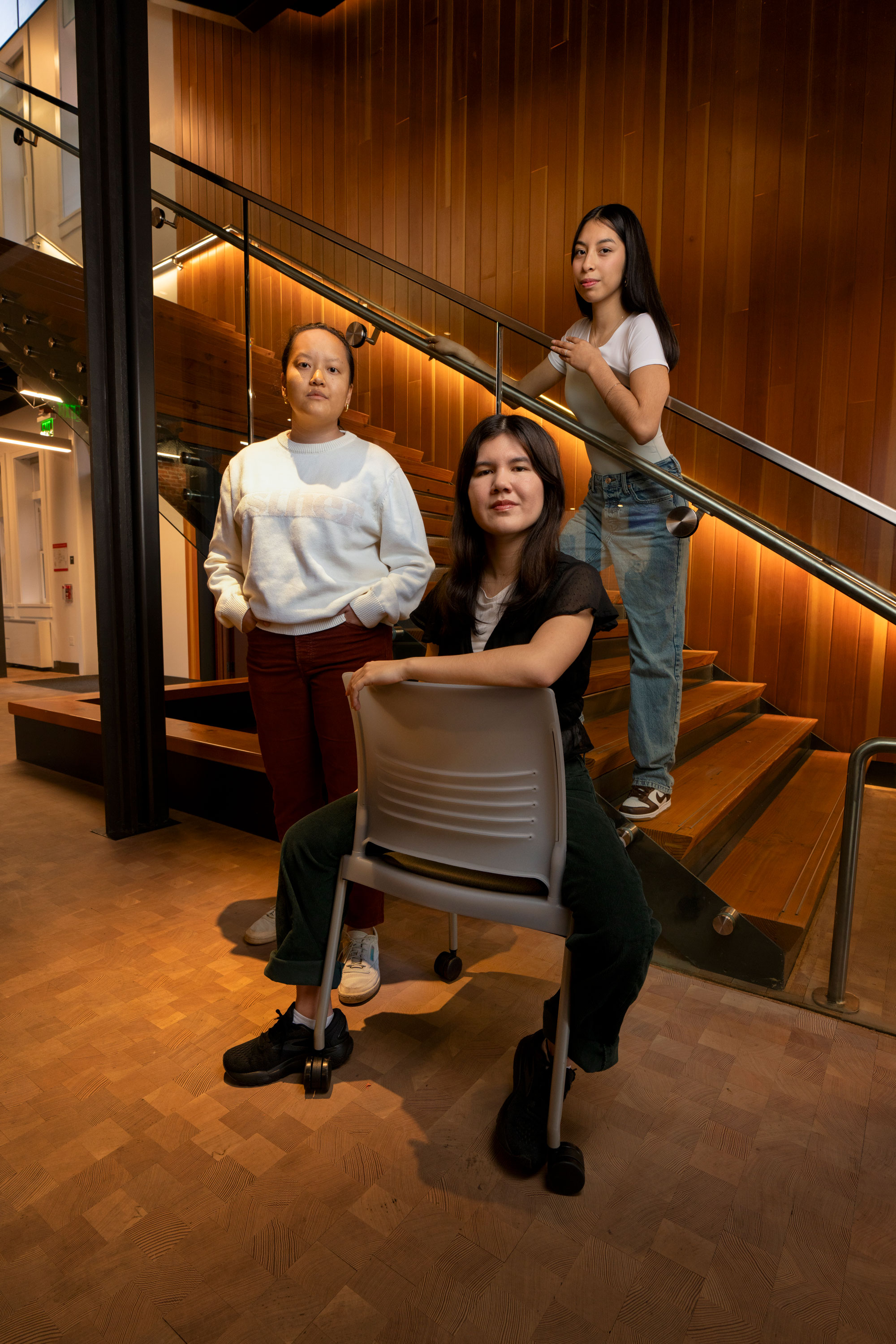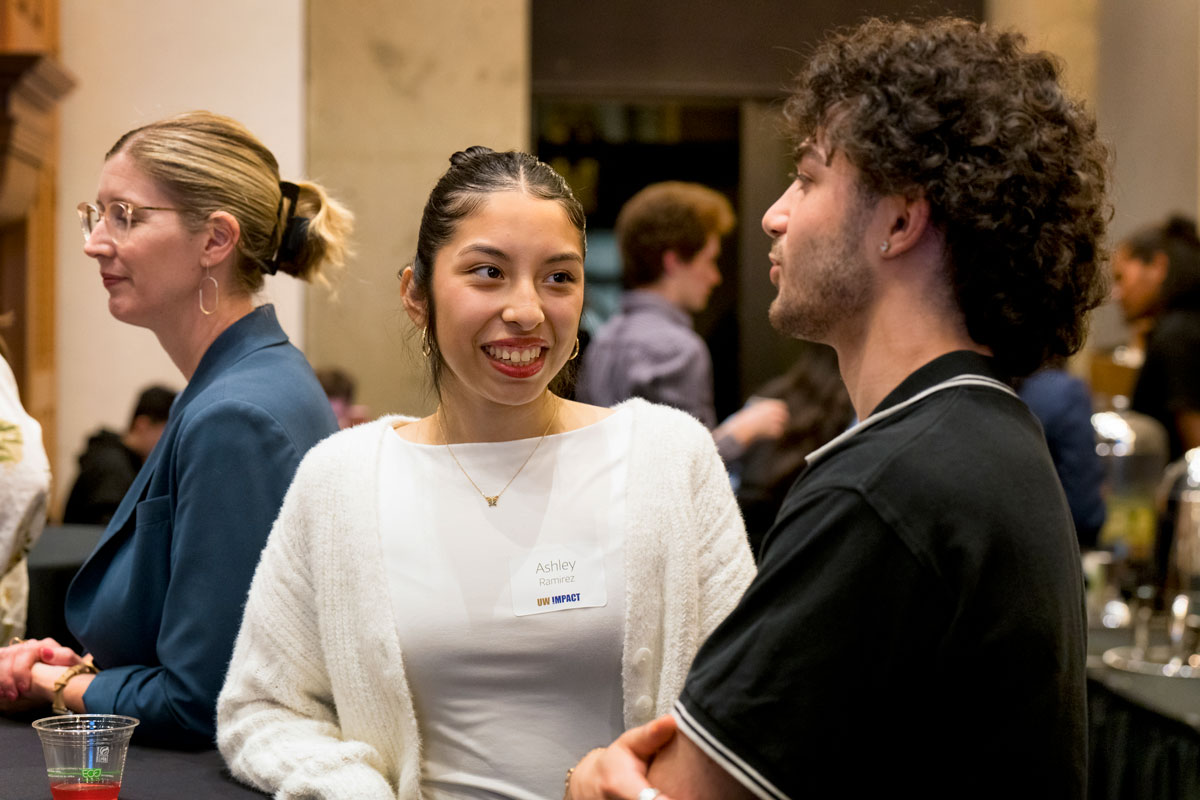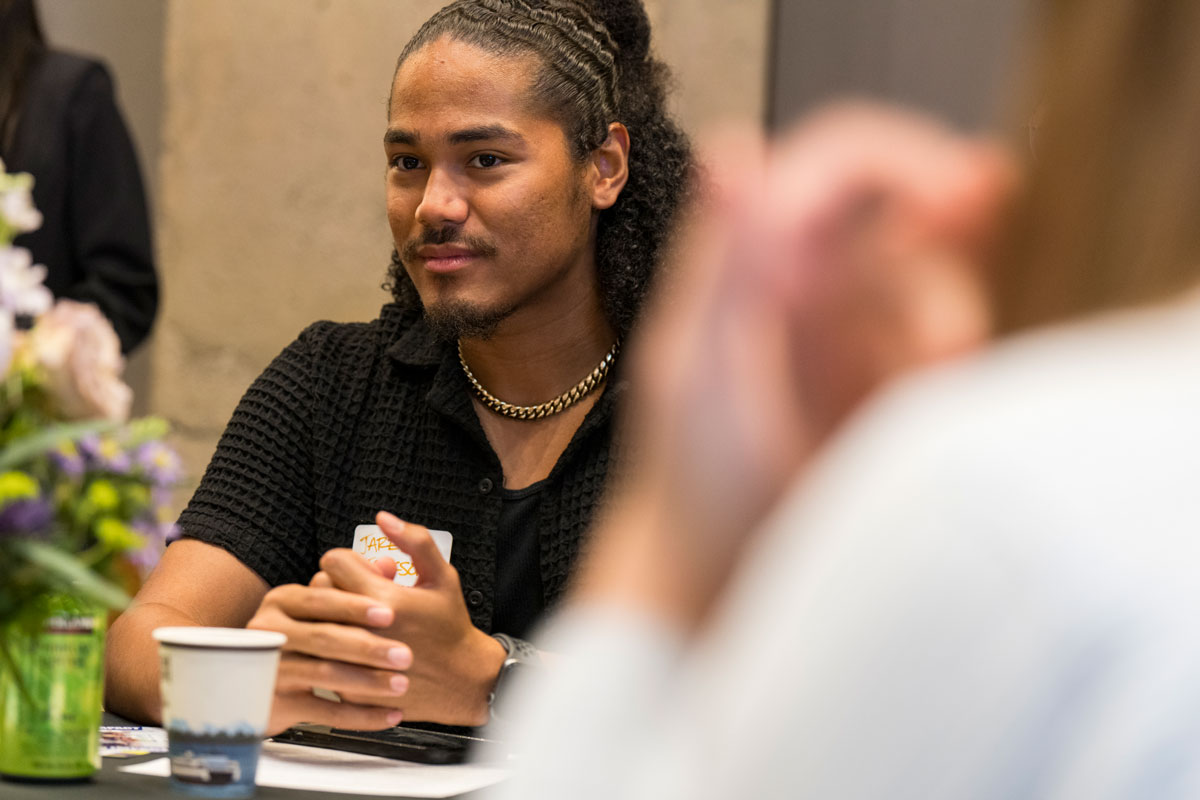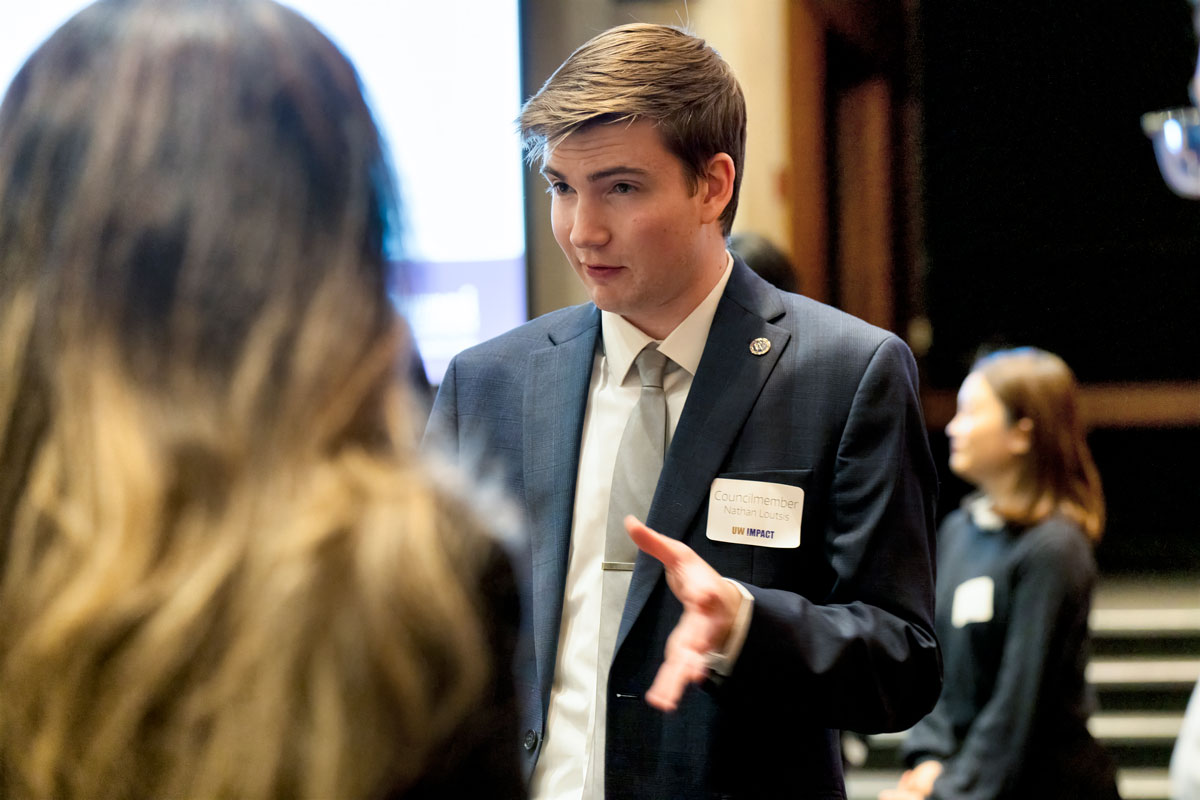The Civics Generation The Civics Generation The Civics Generation
How do you inspire a new generation into public service? The Evans School and CELE Center are connecting students with seasoned leaders and local opportunities to do just that.
By Caitlin Klask | Photos by Rick Dahms | December 2024

Generation Z, one-fifth of the American electorate, made up 40 million eligible voters and about 20 million confirmed voters this election year. But Gen Z represents far more than a ballot: They’re tomorrow’s leaders and changemakers. And, to put it simply, this generation is frazzled.
Adults under the age of 27 grew up during a global recession and attended school remotely through a historic pandemic and national reckoning with racism and police violence. Today, they face socioeconomic challenges, climate change, controversial foreign policy and declining trust in public institutions. Still, young people are motivated.
“So much of the discourse about Gen Z is, these are the pandemic kids,” says Kathryn Pursch Cornforth, ’11, director of community engagement at the UW’s Community Engagement and Leadership Education (CELE) Center. “They’re so used to being focused on their screens. They don’t want to connect with other people.
“My experience of working with college students is just completely opposite of that. There are all of these examples that we can point to of students seeking out connections, seeking out involvement, seeking out ways to make a difference.”
CELE Center and the UW’s Evans School of Public Policy & Governance, both of which boast programs to court young people into civic engagement, offer a program called the NextGen Civic Leader Corps to provide those connections and guide students into public service. It’s a partnership with the Volcker Alliance Next Generation Service Corps, a national network of universities aiming to prepare and inspire the next generation of public servants.
And it’s not just about becoming a lawmaker. “Through NextGen, I can explore how STEM can interact with public policy, and that’s inspired me to pursue more programs with [and take classes at] the Evans School,” says Ava Michler, ’27, an ambassador for the program’s national network, who recently took a trip to Arizona to meet with like-minded NextGen students from universities across the country.
- Ashley Ramirez, ’25, is the UW’s NextGen Civic Leader Corps Co-President. Studying law, policy and sociology, she represents UW Tacoma in the NextGen program.
- Jared Jackson, ’25, listens to lawmakers and peers at a NextGen legislative reception.
- UW graduate student Nathan Loutsis, ’24, is a councilmember for the city of Kenmore and an alumnus of UW’s NextGen Civic Leader Corps. Loutsis began his public service career at age 14, when he joined a King County volunteer program. After meeting lawmakers at NextGen networking events, he came up with new strategies for bettering life in Kenmore.
“We jumped at the opportunity to be able to work with the Evans School,” says Brett Hunt, senior director of Volcker Alliance’s Next Generation Service Initiatives. “When we look at our national network, Evans is right at the top of folks we want to talk about, point to and refer people to talk to.”
Evans School Dean Jodi Sandfort, a proponent of expanding public-policy access for young people, was impressed by the Next Generation program. “They had the audacity to say, ‘What should we be doing to help young people feel a sense of agency? What should we be doing to counter a cynicism that there’s nothing any of us can do in common anymore?” she said in 2022 at a celebration of the UW’s first NextGen cohort.
The program isn’t a minor or a major, and it’s not a student club, either; NextGen is a community of students meeting civic leaders, attending skill-building workshops and networking with fellow civically engaged young people. Members receive priority consideration for scholarship opportunities and, at the end of the program, a certificate and graduation stole. In October, a NextGen event enabled students to meet with Washington lawmakers with UW degrees to connect and get career advice. The perks of the NextGen program are “a way for us to meet students where they are, holistically and equitably,” says Amen Tsegai, undergraduate program manager at the Evans School.
“Giving a name, a language and maybe a micro-credential to help make meaning of things they’re already doing is part of what gets people excited about NextGen,” says Pursch Cornforth. “Think about it like making the implicit explicit. We’re all leading, or all doing leadership activity all the time. It’s just recognizing it as such is the trick.”

Kathryn Pursch Cornforth, ’11, director of community engagement for the CELE Center, works in and with communities to craft learning experiences for students.
Recognition for lived experience can be key to a young adult’s pathway to public service. In the media, youth are often portrayed as lazy, irresponsible and lacking in communication skills. This perspective is sometimes called “adultism” or “adultcentrism,” especially when it results in young people’s opinions going unheard. According to a United Nations study, this disenfranchisement increases apathy among young voters, which can lead to frustration with government.
Meanwhile, civic participation is linked to a healthier transition into adulthood, higher educational outcomes and higher income levels in adulthood—above and beyond the socioeconomic status a person grew up with. But not everyone needs to become a politician or career activist. That’s why NextGen’s interdisciplinary approach makes it easy for a student in any field to explore civics.
When Eamon Challinor, a junior at UW Tacoma, attended a NextGen event at the UW that included state senators, he noticed they didn’t all have political science degrees. “As a computer science student, I was intrigued because these two things don’t seem to mesh. But I noticed civic engagement is interdisciplinary. … you have to have, regardless of what field you’re in, leadership.”
“I don’t think everyone needs to show up to NextGen in the same way,” agrees fourth-year student Esther Himmelfarb, a 2023 NextGen Ambassador studying political science. “There are people who are majoring in engineering who are equally as impacted as I’ve been. It’s important to remember the space we’re trying to create—this cross-sector collaboration for the public good.”
Out of all internship opportunities on UW’s Handshake platform, only 5% are unpaid, and those unpaid internships are connected to public service.
Three years after inception, NextGen now hosts 392 undergraduate students in more than 50 majors across all three UW campuses. Staff envision scaling the program up, but they see a few hurdles.
“The big piece that comes up a lot in my advising meetings is paid internships,” says Dahn Bi Lee-Hong, NextGen Student Engagement Coordinator. Out of all internship opportunities on UW’s Handshake platform, only 5% are unpaid, and those unpaid internships are connected to public service.
Studies point to internships as the most dependable way to engage young people in civics. One-off community-service stints proved to be far less helpful than sustained commitments—like an internship where one feels valued, intellectually and financially. “A great number of those students end up going into nonprofit and government careers, and not everyone comes into an internship thinking that that’s their end point,” says Pursch Cornforth. “So we know that exposure to internships and deep experience with community organizations and schools can shift students’ career framework.”
Another obstacle on the course of civic engagement is networking. While CELE Center, the Evans School and the Volcker Alliance have become “synergistic partners,” according to CELE Center Executive Director Fran Lo, ’99, ’11, the web of democracy-focused programs and resources within the UW is ever expanding, and increasingly intimidating to navigate.
“We’ve heard from students that one of the most valuable things for them is just connection with others. Fran and I call them ‘do-gooders,’” says Pursch Cornforth. “They just want to be connected with other do-gooders. NextGen gives us a stage on which to make those connections a little more formally.”
“There’s this big network, and NextGen is a node in that network, and the role of NextGen is to increase the number of connections made between students,” says Lo. “Not just with each other, but for themselves, and connecting them to other experiences that will deepen and develop their capacity for effective public service, whatever field they go into.”
Evans School Assistant Dean for Advancement & External Relations Lauren Domino, ’05, ’11, agrees. “If somebody wants to be involved, we’ll find a job for them to do, wherever they can give of their time and talent.”
Brett Hunt, of the Volcker Alliance, finds that nationwide, students make civics part of their personal brand. “You’re self-selecting into something bigger than yourself,” he says, which can be a relief to those of us overwhelmed by compounding civic crises. “When somebody has a great degree from a university like the UW and has the skills and leadership experience they gain through NextGen, that’s how we move the needle,” says Hunt.
“We have to instill in everyone who leaves our doors a sense of public good,” says Domino. “This can be the mechanism to do it.”


